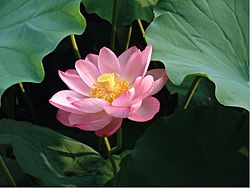Nelumbo facts for kids
Quick facts for kids Nelumbo |
|
|---|---|
 |
|
| Nelumbo nucifera | |
| Scientific classification | |
| Kingdom: | |
| Division: | |
| Class: | |
| Order: | |
| Family: |
Nelumbonaceae
|
| Genus: |
Nelumbo
|
| Species | |
|
Nelumbo lutea (American lotus) |
|
Nelumbo is a group of water plants. They are commonly known as lotus. Lotus flowers are very large. They can grow up to 20 cm wide. These beautiful flowers also smell sweet.
The Sacred lotus grows in Asia. It has lovely pink flowers. The American lotus has bright yellow flowers.
Lotus flowers grow above the water. Their leaves often float right on top. The roots of lotus plants are in the mud under the water. All parts of a plant need air to "breathe," or respire. Lotus plants have air spaces inside their stems and roots. This helps them live and breathe even under water.
People can eat the roots and seeds of lotus plants. Animals like cows enjoy eating the leaves and flowers. Lotuses look a bit like water lilies. Water lilies belong to a different plant family called Nymphaeaceae.
Contents
Amazing Features of Lotus Plants
How Lotus Leaves Stay Clean
Lotus leaves are super good at shedding water. This special ability is called ultrahydrophobicity. It is also known as the "lotus effect." When water drops land on a lotus leaf, they don't spread out. Instead, they form tiny, round beads.
These water beads touch the leaf at only a tiny point. If the leaf tilts even a little, the water drops roll right off. As they roll, they pick up any dirt or dust. This keeps the lotus leaves very clean and dry. It's like the leaves clean themselves!
How Lotus Plants Make Heat
A unique thing about lotus plants is that they can make their own heat. This process is called thermoregulation. They do this using a special way to create energy. It's like they have a tiny heater inside them!
Other plants can also make heat. The eastern skunk cabbage heats itself up. This helps it melt ice and push through the ground in early spring. The elephant yam also warms its flowers. This warmth helps to attract insects that pollinate it. The carrion flower heats up to spread its scent further. This also helps attract more pollinators.
Images for kids
-
A lotus leaf showing the lotus effect after rain.
See also
 In Spanish: Nelumbo para niños
In Spanish: Nelumbo para niños




